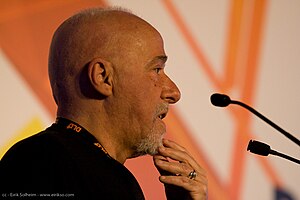| Paulo Coelho (Photo credit: Wikipedia) |
July 14, 1099. Jerusalem awaits the invasion of the crusaders who have surrounded the city’s gates. There, inside the ancient city’s walls, men and women of every age and every faith have gathered to hear the wise words of a mysterious man known only as the Copt. He has summoned the townspeople to address their fears with truth:
 |
| amazon |
“Tomorrow, harmony will become discord. Joy will be replaced by grief. Peace will give way to war... None of us can know what tomorrow will hold, because each day has its good and its bad moments. So, when you ask your questions, forget about the troops outside and the fear inside. Our task is not to leave a record of what happened on this date for those who will inherit the Earth; history will take care of that. Therefore, we will speak about our daily lives, about the difficulties we have had to face.”Coelho uses the manuscript from Accra, allegedly discovered in 1974 by English archaeologist W. Wilkinson, as a record of the meeting of Copta with the people of Jerusalem -a community of Christians, Arabs and Jews- just before the Crusaders’ invasion.
The people begin with questions about defeat, struggle, and the nature of their enemies; they contemplate the will to change and the virtues of loyalty and solitude; and they ultimately turn to questions of beauty, love, wisdom, sex, elegance, and what the future holds. “What is success?” poses the Copt. “It is being able to go to bed each night with your soul at peace.”
Using a series of parables on defeat, love, faith, bravery, friendship and beauty, the Greek sage comforts the gathered and encourages them to salvage and preserve the memory of their civilization after the eminent demise. greeknewsagenda






